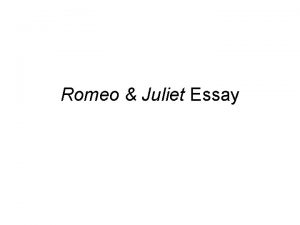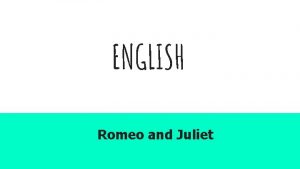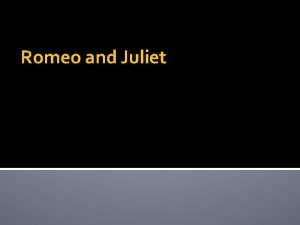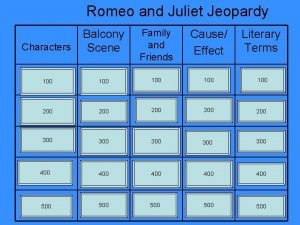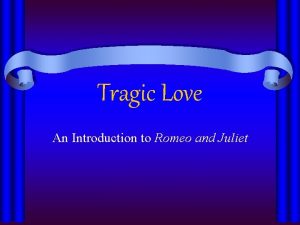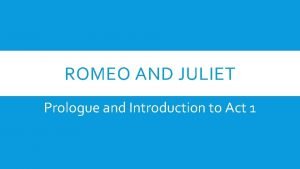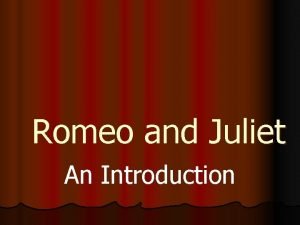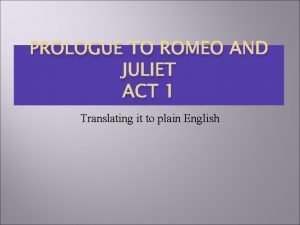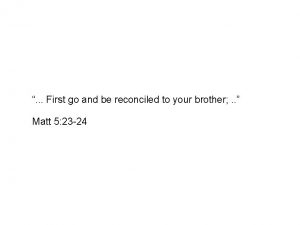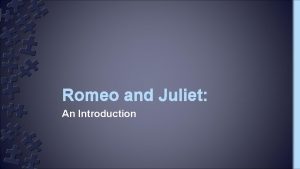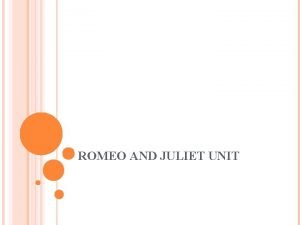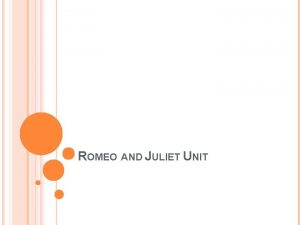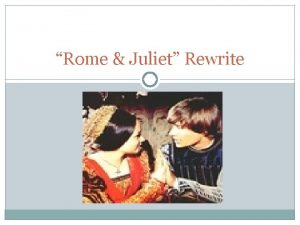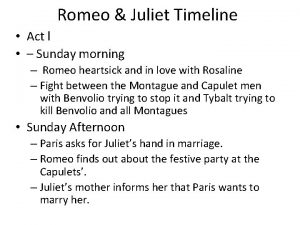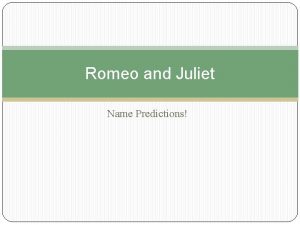Romeo Juliet Essay Introduction Your introduction must have


















- Slides: 18

Romeo & Juliet Essay

Introduction • Your introduction must have the following components: – Hook – Introduce title and author of the play – Thesis

Sample Introduction It was once said, “Each man is the architecture of his own fate. ” In The Tragedy of Romeo and Juliet by William Shakespeare, Romeo and Juliet fall desperately in love with each other at first sight. However, their lives end in tragedy as a result of their own flaws which determined their fates.

Introduction Analysis • Hook: It was once said, “Each man is the architecture of his own fate. ” • Title/Author: In The Tragedy of Romeo and Juliet by William Shakespeare, Romeo and Juliet fall desperately in love with each other at first sight. • Thesis: However, their lives end in tragedy as a result of their own flaws which determined their fates.

Your Turn • Write an introduction that contains the essential components: – Hook – Author and Title Introduction – Thesis

Body Paragraphs • Your body paragraphs prove your thesis. They provide the reasoning behind your argument. • Each body paragraph must be about one topic/reason. • DO NOT SUMMARIZE the play in your body paragraphs. We’ve read it! – Focus on WHY events happened, and not what events happened.

Body Paragraphs • In your body paragraphs, you are making “claims” about why things happened. • You must use quotations from Romeo and Juliet to support your claims. – On the next slides, we will look at one body paragraph that does not contain support, and then the same paragraph that contains support.

Sample Body Paragraph without Support Romeo and Juliet were cursed from the get-go. No matter what, they would never be able to have happy lives together because of the deep-seated hatred that their respective families had for one another. The fact that their marriage was kept a secret shows that they even knew their families would never approve and that it was wrong. A happy marriage cannot be expected when they had to hide their relationship from day one.

Sample Body Paragraph WITH Support Romeo and Juliet were cursed from the get-go. No matter what, they would never be able to have happy lives together because of the deep-seated hatred that their respective families had for one another. After Juliet first meets Romeo, her nurse tells her that he is “[t]he only son of [her] great enemy” (Act I, Scene v, line 134). The fact that their marriage was kept a secret shows that they even knew their families would never approve and that it was wrong. For her wedding, Juliet is told to go “to Friar Lawrence’ cell [and] [t]here stays a husband to make [her] a wife” (Act II, Scene v, lines 68 -69). Rather than a big wedding, she is confined to a small room with just a friar and a groom. A happy marriage cannot be expected when they had to hide their relationship from day one.

Body Paragraph Analysis • Both of the quotations are set up in a way that gives context to the play, and they are used to support the arguments. – Because of their choices, they set themselves up for failure. – They are only concerned with themselves and not with their families.

Look at the worksheet provided Example Evidence Explanation Juliet is courageous because she goes against her powerful family and follows her heart’s desire. Juliet: “I must love a loathed enemy” (Act I, Scene v, line 140). Juliet knows that Romeo is her enemy because he is a Montague. She decides to love him anyway and go against her family traditions. This shows courage.

Your Turn • On the worksheet provided, find evidence to support your claims in your essay. – Example column: state your claim/reason – Evidence column: find a quotation to support your claim/reason (be sure to include scene and line numbers). – Explanation column: explain how the quotation supports your claim/reason and therefore your thesis.

Use the worksheet for your Body Paragraphs Example Evidence Explanation Juliet is courageous because she goes against her powerful family and follows her heart’s desire. Juliet: “I must love a loathed enemy” (Act I, Scene v, line 140). Juliet knows that Romeo is her enemy because he is a Montague. She decides to love him anyway and go against her family traditions. This shows courage.

Sample Body Paragraph Juliet is courageous because she goes against her powerful family and follows her heart’s desire. After she discovers Romeo’s identity, she says “I must love a loathed enemy” (Act I, Scene v, line 140). Juliet knows that Romeo is her enemy because he is a Montague. She decides to love him anyway and go against her family traditions. This shows courage.

Your Turn • Write a body paragraph of your own using the Example, Evidence, Explanation model. – Be sure to properly set-up your quotation.

Conclusions • Your conclusion for a Literary Analysis essay should do the following: – Sum up your points – Give a final thought/lesson learned • All conclusions must: – Restate the Title and Author – Restate thesis and points • Conclusions do not: – – Make new claims Say: “In conclusion…” Say: “This is why I think that…” Say: “Now I’ve told you why…”

Sample Conclusion Tragedy can occur for a variety of reasons; sometimes it is fate and other times it is the result of one’s own flaws. In William Shakespeare’s The Tragedy of Romeo and Juliet, the tragedy is a result of Romeo and Juliet’s flaws. Had they followed their upbringing and the wishes of their families, Romeo and Juliet would not have ended their lives.

Your Turn • Write your own conclusion. – Remember the following: • • • Restate the title and author Restate your thesis and claims Give a final comment/lesson learned Avoid saying, “In conclusion…” Avoid saying, “This is why I think that…”
 Juliet o romeo monologue
Juliet o romeo monologue Romeo and juliet essay intro
Romeo and juliet essay intro Benvolio character traits
Benvolio character traits Hold thy desperate hand art thou a man
Hold thy desperate hand art thou a man Romeo and juliet key quotes and analysis
Romeo and juliet key quotes and analysis Out your
Out your Romeo and juliet poetry
Romeo and juliet poetry Wherefore art thou romeo meaning
Wherefore art thou romeo meaning Romeo ve juliet
Romeo ve juliet Violent delights shakespeare
Violent delights shakespeare Historical background of romeo and juliet
Historical background of romeo and juliet Romeo and juliet prologue act 2
Romeo and juliet prologue act 2 Romeo's cousin and thoughtful friend
Romeo's cousin and thoughtful friend Montague william lll
Montague william lll Romeo and juliet balcony scene translated to modern english
Romeo and juliet balcony scene translated to modern english Benvolio quotes act 1, scene 1
Benvolio quotes act 1, scene 1 3d shapes with 6 faces 8 vertices 12 edges
3d shapes with 6 faces 8 vertices 12 edges I must become less
I must become less First reconcile with your brother
First reconcile with your brother

